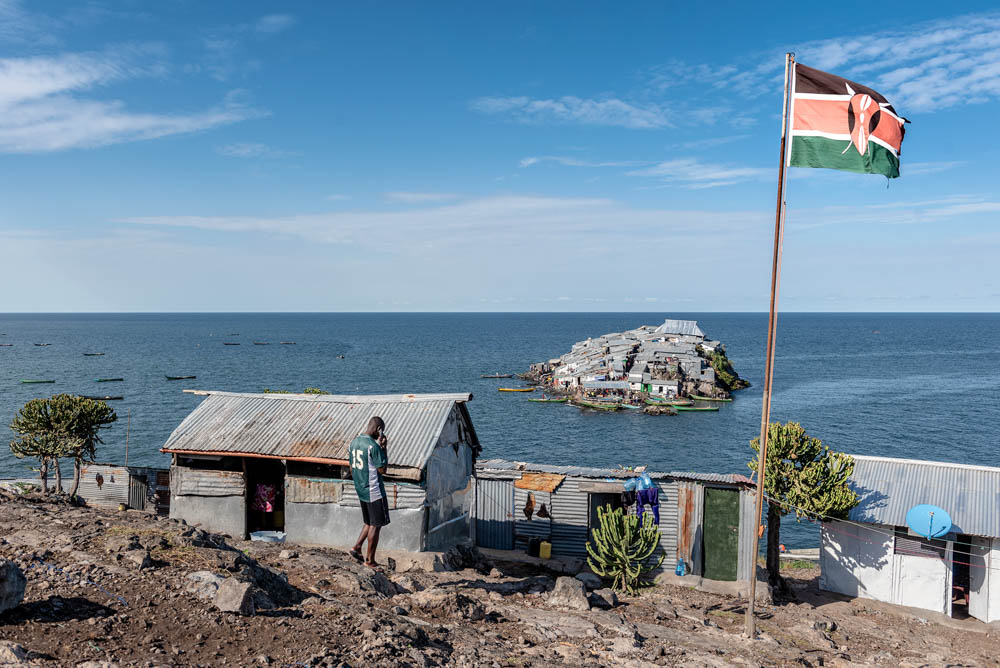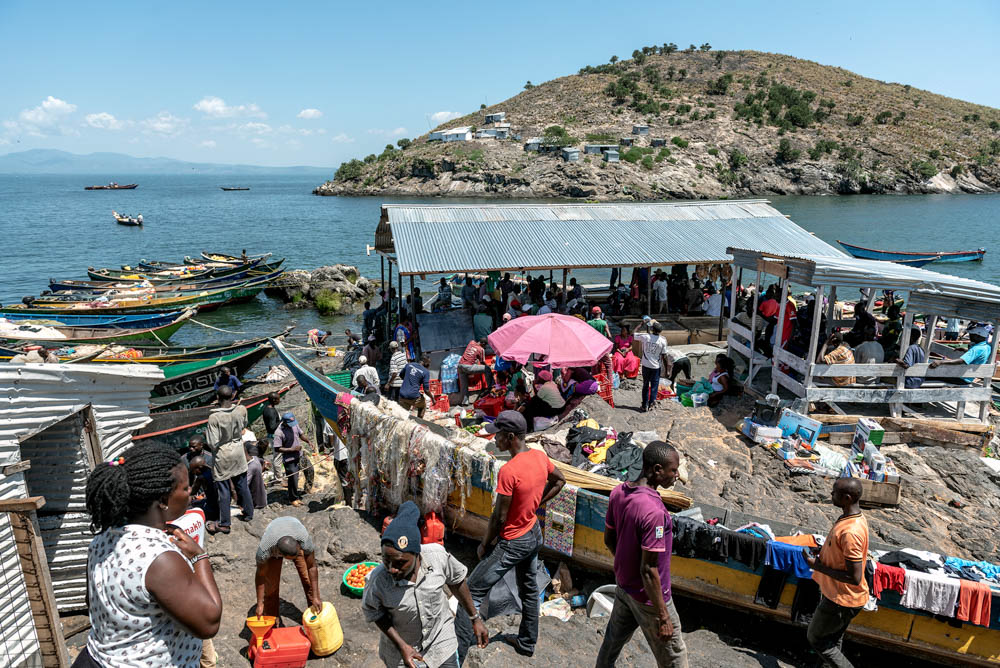Migingo island, Lake Victoria - A round rock crammed with corrugated metal shacks rises out of Lake Victoria right at the border between Kenya and Uganda. The deep waters that surround it are rich with fish.
Migingo Island covers less than half a football pitch but more than 500 people, according to the Ugandan police, live in less than 2,000 square metres area.
The rock island, with its poorly constructed huts, a tiny port, some bars, a brothel and an open-air casino, is heavily contested by Kenya and Uganda that both claim ownership.
Migingo was little more than a rock jutting out of the water before the lake started receding in the early 1990s, according to Emmanuel Kisiangani, a senior researcher at the Pretoria office of the Institute for Security Studies.
Fish catches have hugely diminished over the years in the fishing communities around Lake Victoria because of overfishing and an invasion of water hyacinth plants that blocked transport on the lake and access to ports. But increasingly profitable species such as the Nile perch are still plentiful in the deep waters surrounding Migingo, making the island a valuable and unique fishing hub.
Uganda started to send armed police and marines to Migingo to tax fishermen and offer them protection against pirates in 2004 when the island was still barely inhabited.
The Kenyan fishermen began complaining that they were being harassed by the Ugandan forces for reasons that included illegal fishing in Ugandan waters. In response, the Kenyan government deployed marines to Migingo in a move that nearly brought the two nations to blows.
'Smallest war'
As human settlement began to swell on the rocky island, Kenya and Uganda decided to create a joint committee to determine the border in 2016, relying on maps dating from the 1920s. However, nothing has come of the committee. In the meantime, the island is co-managed by both countries but tensions occasionally flare up with some local fishermen calling it Africa's "smallest war".
"They haven't decided who owns this island," says Ugandan fisherman Eddison Ouma. "It's no-man's land."
Thanks to continuing exports to the European Union and soaring demand for Nile perch in Asia, where its swim bladder, also known as fish maws, is considered a delicacy, the large fish has become an even bigger multimillion-dollar export.
Prices of Nile perch have increased by 50 percent in the last five years, according to Kenyan fisherman Kennedy Ochieng, with large good quality fish bringing in excess of $300 a kilogramme in international markets.

Migingo Island covers less than half a football pitch but over 500 people live on this tiny African fishing island. JEROEN VAN LOON/AL JAZEER

A Kenyan flag flies at the base of the Kenyan marine police station on the larger Usingo Island, overlooking Migingo Island. Kenyan police officers tried to raise a Kenyan flag on Migingo but the island's Ugandan inhabitants protested against it. The Ugandan security forces pulled the flag down despite an initial agreement for joint policing. JEROEN VAN LOON/AL JAZEERA

Fishing boats anchored in the small harbour of Migingo Island. While a boat ride from the Kenyan mainland to Migingo takes two hours, getting from Migingo to Jinja in Uganda takes 18 hours, according to Kenyan fisherman Kennedy Ochieng and Ugandan fisherman Eddison Ouma. This is one of the reasons Kenyans claim the island as their own. JEROEN VAN LOON/AL JAZEERA

While the freshwater fish has been a profitable export to the European Union for several decades, recently there has been soaring demand from Asia, where the swim bladder from big, adult Nile perch are considered a delicacy. JEROEN VAN LOON/AL JAZEERA

Kenyan fisherman Kennedy Ochieng, 37, heads home empty-handed. The Ugandan marine police confiscated his 300kg catch of Nile perch, along with his baits and fuel, after they accused him of fishing in Ugandan waters. JEROEN VAN LOON/AL JAZEERA

Kenyan fishermen around Migingo complain about Ugandan officers harassing them, seizing fish and equipment in what they say are Kenyan waters. While the shallow waters where fish breed are more on the Kenyan side, the deep waters where fishermen fish are more on the Ugandan side. JEROEN VAN LOON/AL JAZEERA

Most fishermen don't own a boat. They have to pay 80 percent of their catch to boat owners on the mainland, according to Ugandan fisherman Eddison Ouma. JEROEN VAN LOON/AL JAZEERA

As fish stocks have sharply diminished in much of Africa's biggest lake, large adult Nile perch are still found in the deep waters of Lake Victoria that surround Migingo making the island contested. JEROEN VAN LOON/AL JAZEERA

While many Kenyans go home for the weekend, most Ugandans visit their families only once or twice a year as it takes them 18 hours to reach the Ugandan mainland. JEROEN VAN LOON/AL JAZEERA

The densely populated island also has an open-air makeshift casino where fishermen try their luck. JEROEN VAN LOON/AL JAZEERA

Some women accompany their husband to the island and often work in the little restaurants or kitchens on Migingo. JEROEN VAN LOON/AL JAZEERA

Daniel Obadha, 35, is a Kenyan electrician who has been running a barber shop and phone charging shop on the densely populated island for two years. 'I like to live on Migingo. Thanks to many customers coming not only from Kenya but also from Uganda and Tanzania, there is a lot of business and I earn much more money than I did on the mainland,' he said. JEROEN VAN LOON/AL JAZEERA

Ugandan fisherman Eddison Ouma, 32, has lived on Migingo Island for five years and visits his wife and two children only twice a year. 'We don't have jobs. That's why we are fishing,' said Ouma, who pays a few fish to the patrolling Ugandan police as a 'protection tax'. JEROEN VAN LOON/AL JAZEERA

Migingo Island also has a tiny clinic where a nurse treats minor issues, like stitching wounds and testing for malaria. However, for bigger medical problems, the inhabitants have to travel to the Kenyan mainland. JEROEN VAN LOON/AL JAZEERA

The growing demand for big adult Nile perch leads to more tensions around Migingo Island. Local Kenyan politicians have recently demanded the Kenyan government to ask the International Court of Justice to intervene and take a decision on the border. JEROEN VAN LOON/AL JAZEERA

Thanks to the growing demand, prices of Nile perch rose by 50 percent in the last five years, according to Kenyan fisherman Kennedy Ochieng. JEROEN VAN LOON/AL JAZEERA

No comments:
Post a Comment